136 scholarly books by Dartmouth College Press and 18
have author last names that start with R
136 scholarly books by Dartmouth College Press and 18
136 scholarly books by Dartmouth College Press
18 have author last names that start with R have author last names that start with R
18 have author last names that start with R have author last names that start with R
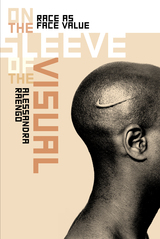
On the Sleeve of the Visual
Race as Face Value
Alessandra Raengo
Dartmouth College Press, 2013
In this landmark work of critical theory, black studies, and visual culture studies, Alessandra Raengo boldly reads race as a theory of the image. By placing emphasis on the surface of the visual as the repository of its meaning, race presents the most enduring ontological approach to what images are, how they feel, and what they mean. Having established her theoretical concerns, the author’s eclectic readings of various artifacts of visual culture, fine arts, cinema, and rhetorical tropes provoke and destabilize readers’ visual comfort zone, forcing them to recognize the unstated racial aspects of viewing and the foundational role of race in informing the visual.
[more]

Le Français - Instructor’s Manual
Départ—Arrivée
John Rassias
Dartmouth College Press, 2008
The third of three connected volumes of Le Français, making up a unique French language tutorial by the renowned creator of The Rassias Method®
[more]

The Best of Rilke
72 Form-True Verse Translations with Facing Originals, Commentary, and Compact Biography
Rainer Maria Rilke
Dartmouth College Press, 1991
Rainer Maria Rilke’s best poems are finally available in translations so faithful yet free flowing that a reader forgets they were not originally written in English. Applying the same principle of “form-true” rendering that earned him the Bollingen Prize for his translation of Pushkin’s Eugene Onegin, poet-translator Walter Arndt boldly claims to reproduce in English for the first time the prosodic identity of Rilke’s finest rhymed poems.
[more]
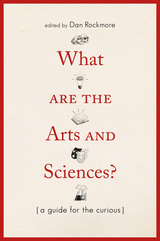
What Are the Arts and Sciences?
A Guide for the Curious
Dan Rockmore
Dartmouth College Press, 2017
What constitutes the study of philosophy or physics? What exactly does an anthropologist do, or a geologist or historian? In short, what are the arts and sciences? While many of us have been to college and many aspire to go, we may still wonder just what the various disciplines represent and how they interact. What are their origins, methods, applications, and unique challenges? What kind of people elect to go into each of these fields, and what are the big issues that motivate them? Curious to explore these questions himself, Dartmouth College professor and mathematician Dan Rockmore asked his colleagues to explain their fields and what it is that they do. The result is an accessible, entertaining, and enlightening survey of the ideas and subjects that contribute to a liberal education. The book offers a doorway to the arts and sciences for anyone intrigued by the vast world of ideas.
[more]

Life beyond Medicine
The Joys and Challenges of Physician Retirement
Sharon Romm
Dartmouth College Press, 2018
Physicians retire at all ages—older doctors forsake medical practice when tired of it or when forced to do so by age or illness; younger practitioners leave because of burnout, disillusionment with the medical system, or a desire to engage in new activities. But research and literature about physician retirement is scanty. Given the limited resources available, many physicians who want to retire from medicine remain mired in indecision, wondering how their life might be different if they left medicine. Sharon Romm has written the definitive guide to help health care professionals of all ages prepare for the joys and challenges ahead.
[more]
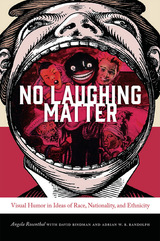
No Laughing Matter
Visual Humor in Ideas of Race, Nationality, and Ethnicity
Angela Rosenthal
Dartmouth College Press, 2015
In the wake of the Charlie Hebdo attacks, this collection—which gathers scholars in the fields of race, ethnicity, and humor—seems especially urgent. Inspired by Denmark’s Muhammad cartoons controversy, the contributors inquire into the role that racial and ethnic stereotypes play in visual humor and the thin line that separates broad characterization as a source of humor from its power to shock or exploit. The authors investigate the ways in which humor is used to demean or give identity to racial, national, or ethnic groups and explore how humor works differently in different media, such as cartoons, photographs, film, video, television, and physical performance. This is a timely and necessary study that will appeal to scholars across disciplines.
[more]

Essay on the Origin of Languages and Writings Related to Music
Jean Jacques Rousseau
Dartmouth College Press, 2009
"J.J. was born for music," Jean-Jacques Rousseau wrote of himself, "not to be consumed in its execution, but to speed its progress and make discoveries about it. His ideas on the art and about the art are fertile, inexhaustible." Rousseau was a practicing musician and theorist for years before publication of his first Discourse, but until now scholars have neglected these ideas. This graceful translation remedies both those failings by bringing together the Essay, which John T. Scott says "most clearly displays the juncture between Rousseau's musical theory and his major philosophical works," with a comprehensive selection of the musical writings. Many of the latter are responses to authors like Rameau, Grimm, and Raynal, and a unique feature of this edition is the inclusion of writings by these authors to help establish the historical and ideological contexts of Rousseau's writings and the intellectual exchanges of which they are a part. With an introduction that provides historical background, traces the development of Rousseau's musical theory, and shows that these writings are not an isolated part of his oeuvre but instead are animated by the same "system," this volume fashions a much-needed portal through which literary scholars, musicologists, historians, and political theorists can enter into an important but hitherto overlooked chamber of Rousseau's vast intellectual palace.
[more]
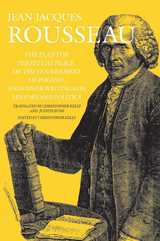
The Plan for Perpetual Peace, On the Government of Poland, and Other Writings on History and Politics
Jean-Jacques Rousseau
Dartmouth College Press, 2011
These abridgements of The Plan for Perpetual Peace (published 1761), On the Government of Poland (1771–1772), and Jean-Jacques Rousseau’s other writings on history and politics represent his considerations of the practical applications of key principles developed in his best-known theoretical writings. In this latest volume in the classic series, Rousseau reflects on projects for a European union; the possibilities for governmental reform for France, including the polysynody experiment; international relations; and the establishment of governments for Poland and Corsica, both recently liberated from foreign oppression. Taken together, these works offer definitive insights into Rousseau’s decidedly nonutopian thoughts on cosmopolitanism and nationalism, and on the theory and practice of politics.
[more]

Rousseau, Judge of Jean-Jacques
Dialogues
Jean-Jacques Rousseau
Dartmouth College Press, 2012
One of Rousseau’s later and most puzzling works and never before available in English, this neglected autobiographical piece was the product of the philosopher’s old age and sense of persecution. Long viewed simply as evidence of his growing paranoia, it consists of three dialogues between a character named “Rousseau” and one identified only as “Frenchman” who discuss the bad reputation and works of an author named “Jean-Jacques.” Dialogues offers a fascinating retrospective of his literary career.
[more]

Discourse on the Sciences and Arts (First Discourse) and Polemics
Jean-Jacques Rousseau
Dartmouth College Press, 1992
Contains the entire First Discourse, contemporary attacks on it, Rousseau’s replies to his critics, and his summary of the debate in his preface to Narcissus. A number of these texts have never before been available in English. The First Discourse and Polemics demonstrate the continued relevance of Rousseau’s thought. Whereas his critics argue for correction of the excesses and corruptions of knowledge and the sciences as sufficient, Rousseau attacks the social and political effects of the dominant forms of scientific knowledge.
[more]

Social Contract, Discourse on the Virtue Most Necessary for a Hero, Political Fragments, and Geneva Manuscript
Jean-Jacques Rousseau
Dartmouth College Press, 1994
Contains the Social Contract, as well as the first English translation of Rousseau’s early Discourse on the Virtue Most Necessary for a Hero, numerous previously untranslated political fragments, and the first draft of the Social Contract (the so-called Geneva Manuscript). By placing Rousseau’s famous exposition of “political right” and the “general will” in the context of his preparatory drafts, the editors provide significant insight into the formation of one of the most important and influential works in Western political thought.
[more]

Discourse on the Origins of Inequality (Second Discourse), Polemics, and Political Economy
Jean-Jacques Rousseau
Dartmouth College Press, 1993
Includes the Second Discourse (complete with the author’s extensive notes), contemporary critiques by Voltaire, Diderot, Bonnet, and LeRoy, Rousseau’s replies (some never before translated), and Political Economy, which first outlined principles that were to become famous in the Social Contract. This is the first time that the works of 1755 and 1756 have been combined with careful commentary to show the coherence of Rousseau’s “political system.” The Second Discourse examines man in the true “state of nature,” prior to the formation of the first human societies, tracing the “hypothetical history” of political society and social inequality as they developed out of natural equality and independence.
[more]

The Reveries of the Solitary Walker, Botanical Writings, and Letter to Franquières
Jean-Jacques Rousseau
Dartmouth College Press, 2000
“I am now alone on earth, no longer having any brother, neighbor, friend, or society other than myself” proclaimed Rousseau in Reveries of the Solitary Walker. Reveries, along with Botanical Writings and Letter to Franquières, were all written at the end of his life, a period when Rousseau renounced his occupation as author and ceased publishing his works. Presenting himself as an unwilling societal outcast, he nonetheless crafted each with a sharp eye on his readership. Whether addressing himself, a mother hoping to interest her child in botany, or a confused young nobleman, his dialogue reflects the needs of his interlocutor and of future readers. Although very different in style, these three works concern overlapping subjects. Their unity comes from the relation of the other writings to the Reveries, which consists of ten meditative “walks” during which Rousseau considers his life and thought. The third and fourth walks discuss truth, morality, and religious belief, which are the themes of the Letter to Franquières; while the seventh is a lengthy discussion of botany as a model for contemplative activity. The overarching themes of the volume—the relations among philosophic or scientific contemplation, religion, and morality—provide Rousseau’s most intimate and final reflections on the difficulties involved in understanding nature.
[more]
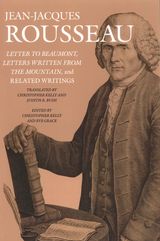
Letter to Beaumont, Letters Written from the Mountain, and Related Writings
Jean-Jacques Rousseau
Dartmouth College Press, 2012
Published between 1762 and 1765, these writings are the last works Rousseau wrote for publication during his lifetime. Responding in each to the censorship and burning of Emile and Social Contract, Rousseau airs his views on censorship, religion, and the relation between theory and practice in politics. The Letter to Beaumont is a response to a Pastoral Letter by Christophe de Beaumont, Archbishop of Paris (also included in this volume), which attacks the religious teaching in Emile. Rousseau’s response concerns the general theme of the relation between reason and revelation and contains his most explicit and boldest discussions of the Christian doctrines of creation, miracles, and original sin. In Letters Written from the Mountain, a response to the political crisis in Rousseau’s homeland of Geneva caused by a dispute over the burning of his works, Rousseau extends his discussion of Christianity and shows how the political principles of the Social Contract can be applied to a concrete constitutional crisis. One of his most important statements on the relation between political philosophy and political practice, it is accompanied by a fragmentary “History of the Government of Geneva.” Finally, “Vision of Peter of the Mountain, Called the Seer” is a humorous response to a resident of Motiers who had been inciting attacks on Rousseau during his exile there. Taking the form of a scriptural account of a vision, it is one of the rare examples of satire from Rousseau’s pen and the only work he published anonymously after his decision in the early 1750s to put his name on all his published works. Within its satirical form, the “Vision” contains Rousseau’s last public reflections on religious issues. Neither the Letter to Beaumont nor the Letters Written from the Mountain has been translated into English since defective translations that appeared shortly after their appearance in French. These are the first translations of both the “History” and the “Vision.”
[more]
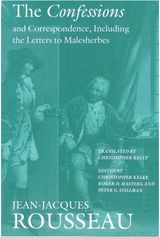
The Confessions and Correspondence, Including the Letters to Malesherbes
Jean-Jacques Rousseau
Dartmouth College Press, 1998
When Rousseau first read his Confessions to a 1770 gathering in Paris, reactions varied from admiration of his candor to doubts about his sanity to outrage. Indeed, Rousseau's intent and approach were revolutionary. As one of the first attempts at autobiography, the Confessions' novelty lay not in just its retelling the facts of Rousseau's life, but in its revelation of his innermost feelings and its frank description of the strengths and failings of his character. Based on his doctrine of natural goodness, Rousseau intended the Confessions as a testing ground to explore his belief that, as Christopher Kelly writes, "people are to be measured by the depth and nature of their feelings." Re-created here in a meticulously documented new translation based on the definitive Pléiade edition, the work represents Rousseau's attempt to forge connections among his beliefs, his feelings, and his life. More than a "behind-the-scenes look at the private life of a public man," Kelly writes, "the Confessions is at the center of Rousseau's philosophical enterprise."
[more]
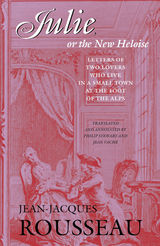
Julie, or the New Heloise
Letters of Two Lovers Who Live in a Small Town at the Foot of the Alps
Jean-Jacques Rousseau
Dartmouth College Press, 1997
An elegant translation of one of the most popular novels of its time. Rousseau's great epistolary novel, Julie, or the New Heloise, has been virtually unavailable in English since 1810. In it, Rousseau reconceptualized the relationship of the individual to the collective and articulated a new moral paradigm. The story follows the fates and smoldering passions of Julie d'Etange and St. Preux, a one-time lover who re-enters Julie's life at the invitation of her unsuspecting husband, M. de Wolmar. The complex tones of this work made it a commercial success and a continental sensation when it first appeared in 1761, and its embodiment of Rousseau's system of thought, in which feelings and intellect are intertwined, redefined the function and form of fiction for decades. As the characters negotiate a complex maze of passion and virtue, their purity of soul and honest morality reveal, as Rousseau writes in his preface, "the subtleties of heart of which this work is full." A comprehensive introduction and careful annotations make this novel accessible to contemporary readers, both as an embodiment of Rousseau's philosophy and as a portrayal of the tension and power inherent in domestic life.
[more]
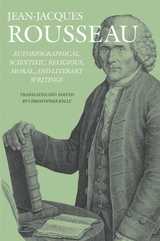
Autobiographical, Scientific, Religious, Moral, and Literary Writings
Jean Rousseau
Dartmouth College Press, 2014
Newcomers to Rousseau’s works and those who are familiar with his writings will find something to surprise them both in this wide variety of short pieces from every period of his life. Among the important theoretical writings found here are the “Fiction or Allegorical Fragment on Revelation” and the “Moral Letters,” which are among Rousseau’s clearest statements about the nature and limits of philosophic reasoning. In the early “Idea of a Method for the Composition of a Book,” Rousseau lays out in advance his understanding of how to present his ideas to the public. He ponders the possibilities for and consequences of air travel in “The New Daedalus.” This volume also contains both his first and last autobiographical statements. Some of these writings show Rousseau’s lesser-known playful side. A comic fairy tale, “Queen Whimsical”, explores the consequences—both serious and ridiculous—for a kingdom when the male heir to the throne, endowed with the frivolous characteristics of his mother, has a sister with all the characteristics of a good monarch. When Rousseau was asked whether a fifty-year old man could write love letters to a young woman without appearing ridiculous, he responded with “Letters to Sophie,” which attempt to demonstrate that such a man could write as many as four—but not as many as six—letters before he became a laughingstock. In “The Banterer,” he challenges readers to guess whether the work they are reading was written by an author who is “wisely mad” or by one who is “madly wise.” When Rousseau was challenged to write a merry tale, “without intrigue, without love, without marriage, and without lewdness,” he produced a work considered too daring to be published in France.
[more]
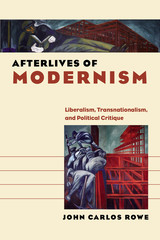
Afterlives of Modernism
Liberalism, Transnationalism, and Political Critique
John Carlos Rowe
Dartmouth College Press, 2015
In times of liberal despair it helps to have someone like John Carlos Rowe put things into perspective, in this case, with a collection of essays that asks the question, “Must we throw out liberalism’s successes with the neoliberal bathwater?” Rowe first lays out a genealogy of early twentieth-century modernists, such as Gertrude Stein, John Dos Passos, William Faulkner, and Ralph Ellison, with an eye toward stressing their transnationally engaged liberalism and their efforts to introduce into the literary avant-garde the concerns of politically marginalized groups, whether defined by race, class, or gender. The second part of the volume includes essays on the works of Harper Lee, Thomas Berger, Louise Erdrich, and Philip Roth, emphasizing the continuity of efforts to represent domestic political and social concerns. While critical of the increasingly conservative tone of the neoliberalism of the past quarter-century, Rowe rescues the value of liberalism’s sympathetic and socially engaged intent, even as he criticizes modern liberalism’s inability to work transnationally.
[more]
READERS
Browse our collection.
PUBLISHERS
See BiblioVault's publisher services.
STUDENT SERVICES
Files for college accessibility offices.
UChicago Accessibility Resources
home | accessibility | search | about | contact us
BiblioVault ® 2001 - 2024
The University of Chicago Press









